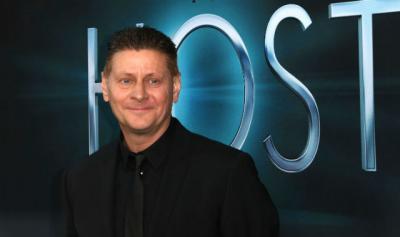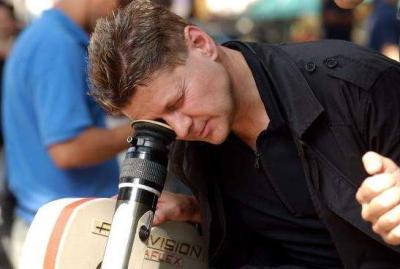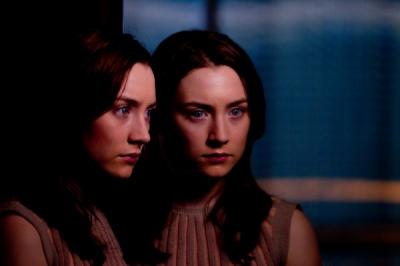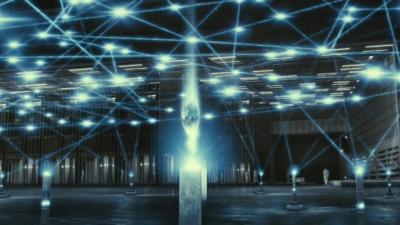By: debbie lynn elias
The guru behind the “Twilight” saga, Stephenie Meyer’s latest novel, THE HOST, comes to the big screen courtesy of writer/director Andrew Niccol. A perfect blend of science fiction, romance, friendship and the best part of humanity, parasitic aliens called “Souls” now reside on earth. Looking like ethereal paramecium, the Souls inhabit human bodies, forcing the human spirit to “die” and turning earth into a peaceful, bland and plain wrap planet. THE HOST centers on one such inhabited human, Melanie Stryder, who once inhabited by a Soul calling herself Wanderer, refuses to die. Saoirse Ronan plays Melanie/Wanderer. And pursuing this determined human is a “Seeker” who is expertly brought to her antagonistic life by Diane Kruger.

Having read the novel, I wasn’t sure what to expect in the film adaptation as while Meyer is good at conceptualization, her writing skills are lacking and go to the superfluous. Thankfully New Zealander Andrew Niccol [The Terminal, The Truman Show, Gattaca, Lord of War] stepped in here to write the screenplay and direct, eliminating the baggage of the book and courtesy of stunning visual tonal bandwidth, elevates THE HOST into a fascinating and beyond enjoyable movie-going experience.
Already knowing Andrew Niccol to be man with a great sense of humor and keen insight and directorial skill, it was a pleasure to sit down with him in this exclusive 1:1 interview talking Souls, Seekers, Saoirse Ronan and Stephenie Meyer.
Andrew, I love what you did with the book, adapting it into a film. The visual aesthetic is so astounding. Two exceedingly strong stand-outs in THE HOST are Andy Nicholson’s production and Roberto Schaefer’s cinematography. How did you bring these gentlemen into the project and then how did the three of you collaborate to develop this gorgeous visual tonal bandwidth you’ve established. You have distinct worlds but with a cohesiveness amongst everything.
Thank you. Please stop! It’s embarrassing. [laughing & smiling] They are always my left and right hand. Andy is up and coming. I was speaking to Alex McDowell who I worked with on my previous film and he wasn’t available so I said, “Who is the next Alex McDowell?” and he said, “Andy Nicholson.” That’s how he came to me. And Roberto, of course, who also worked with Mark Foster for awhile. What did we decide? Design philosophy all comes out of the Souls‘ philosophy. There’s nothing flashy about them. They never draw attention to themselves. That’s why the wardrobe is very understated. They would never do anything that says, “Hey, look at me!” The only exception to that are the Seekers who have to stand out. They obviously have an affinity to chrome, not perhaps Roberto Schaeffer‘s favorite decision in the movie since he has to photograph it himself in a chrome car, but the chrome and the white for the purity all came together. It seemed to work well.
The chrome – and mirrors – adds this sensibility of duality to the film also because everything is reflected back at you.
Right. I made a decision early on with Roberto, anytime that I can photograph someone’s shadow, Saoirse’s shadow especially, just to keep highlighting the duality of her life, her reflection, water – she will pass water – anytime I could that I would attempt top do it. There’s a lot of mirrors. It was a fun thing to play with as a little motif in a movie.
It worked! The mirrors, the mirrored cars, the mirrors for the survivors in the cave, the mirrors for the Souls and the Seekers, it all gives you that common thread. It also goes to survival for both species which is a great underlying theme.
And then the human world was as dirty as the Soul world is clean.
The cave sequences are so beautifully rendered, especially in terms of the cinematography. The golden umbers of the light, the warmth – which is a great stark contrast to the cool, white, silver.
That was deliberate as well. It’s earth tones because, of course, humans are of the Earth, and that cool sort of spacey thing are creatures from another world.

How long did it take you to come up with the visual design and the direction you wanted to do with it?
It starts right from when I put pen to paper. I write the way that other people don’t write, apparently. I’m always stunned that a studio will sign off on a movie from 120 pages having no clue really what it’s going to look like. Whereas I have to look at it in a different way. As soon as I start writing, I‘m collecting visuals to try and make everything real to me. And of the thousands of images that I have, it’s all of those images and it’s none of them, if you know what I mean. But the weird thing is that when it’s all laid out, people are always shocked because the movie will end up looking like that in some way.
Having done some direction and production myself, I always had to have visuals. I can’t just write and not create a visual.
That’s why I was always stunned, am stunned, at these 120 blank pages. But when I go to talk to a studio about a movie, I have thousands of images. They can see what their movie is gonna look like. The English language is notoriously unreliable but images! That‘s why I can say, “It can look like that!”
So many today can‘t think with verbiage. In today‘s society everything is about the quickness in seeing rather than absorbing words and comprehending.
I think also we’ve become lazy with language.
That’s another thing that‘s so lovely about your script. Language is so important and the words that are spoken are very deliberate and prophetic in many senses.
I liked the poetry in the book and also I made sure that remained in the movie. I’m arrogant enough to want my movies to last the test of time. So I don’t put contemporary jargon into a movie or contemporary references because next year they won’t mean anything.
It’s interesting you say that about your films because I think about films like The Terminal, like The Truman Show, and they are timeless.
Yes. I want that to be there. I don’t want some sort of “in joke” now for people [where] you get a cheap laugh, but in five or ten years people are looking at each other, “What does that mean?” [laughing]
That‘s something that‘s very very beautiful about your films. Even in Lord of War!
Yes! Even though that was “of its time”, it’s timeless.

Another standout aspect of THE HOST is with Saoirse and the voice of Wanda/Wanderer and Melanie, yet she has a distinct cadence and elocution as each persona.
That was really deliberate. We tracked it through the course of the movie. First of all, her character is much “lippier” as the human and she has sarcasm and irony that Wanda – Wanderer, as she begins – doesn’t have. So she gradually learns it over the course of the movie. We would always go, “At this point of the movie, how savvy has she become with the language? Does she have a sense of human now? Is she able to use the language enough in a funny way?” So she learned sarcasm. She was taught by the other voice inside her [Melanie]. So, by the end [Wanda] can talk back. That was really an interesting part of it. And she would speak sort of like you just got a Berlitz tape and were just learning the language for the first time so there were no contractions. She wouldn’t say “wouldn’t”, she would say “would not.” Gradually she got used to the language and it became more colloquial.
That differential with the elocution and cadence is so remarkable.
[Melanie] also taught [Wanda] to lie! Souls don’t lie! [laughing] The scene where’s she going in to steal the medicine, which they also wouldn’t do, and she’s coming up with an excuse of how she cut herself. [Melanie voice] “Tell her you tripped. Tell her you tripped.” “I tripped.”
But “I had a knife in my hand!” That tag-on sent me into peals of laughter.
Right! Exactly! And of course the nurse, the Healer, is so trusting because no one lies, no other Soul would lie to you. It’s so funny.
The multi-layered social commentary is fascinating to watch unfold. It‘s something that while in the book is somewhat convoluted but, with the film you can really understand the comprehensive level of it all with what you do on screen. It really heightens that .
Right. As soon as you see “Store”. We‘re in such a consumer society, as soon as we see something that’s unbranded” we all get it because we are just inundated with labels and thatfs one of the things that I had to do.I had to “denude” the world. There is no signage because there’s no commerce, there‘s no competition. I cleaned up the world! [laughing]
You truly did. Stephenie Meyer has great “concept”, but gets very wordy, very verbiage heavy and superfluous in so many areas.
Right. And in a novel like [THE HOST], the movie is more like a poem because you cut. All that repetition has to go.
How is it for you directing your own words versus directing someone else’s or having somebody direct your words?
That’s a bit frightening. [laughing] Even adapting the story, I own [the words]. I have to embrace it and say “These are mine. This is my dialogue now.” For me, Stephenie Meyer writes movie dialogue. I would be reading the book and see, “It’s a strange world, the strangest” and there’s an echo of that in the novel and I’d go, “Yea, that’s an entry line.”
But I think if you go back to her early books, like the first Twilight, she altered her writing style and made a lot of the dialogue over the years more “movie-centric.” It‘s interesting to see her evolution as a writer in that respect.
And she’s crazy like a fox because she does make all of these characters…young. And she has made vampire movies for people who wouldn’t normally go and see vampire movies. And now she’s making science fiction for people who wouldn‘t normally go to see science fiction, which is a real trick. It’s also science fiction for woman and girls which I don’t know if anyone has ever attempted that.
I know Paula [producer, Paula Mae Schwartz] was talking and saying the mindset is “It‘s for guys”. We are all guilty of thinking “guys = sci-fi, guys = sci-fi” but we don’t think “girls = sci-fi.”
It’s much easier in this business to cast women because there are so few good roles for women. I would joke with Saoirse and say,“Saoirs, not only have you got one of the best roles for women, you‘ve got two of them!” [laughing] And she does! And then to go on and make the antagonist [Seeker] also a woman, wow!
The guys get to stand there and look good.
They’re the eye candy!
Uh, very much so!
But that’s interesting, isn’t it? So, bless Stephanie Meyer in some ways. [Women] are 50% of the population, actually more.

What do you like to gravitate towards as a director, as a writer? Is there an issue or thematic element that speaks to you more?
No. I think as far as science fiction goes, I‘m always looking for the humanity within the technology. And the human spirit as well, which is what I love. That’s why I’m drawn towards this character who will not die inside this body. We all like to think of ourselves as fighters like that, so I love that perseverance that she has; that she’s not going to fade away like the rest; and fight back. So it makes for that great drama.
I also noticed, and I saw this with The Truman Show as well, free will, is also a big element that comes into play with your films.
Yea. Gattaca, as well. He’s told, “You are going to be this. Your genes dictate it.” I always think, what’s in-between the genes?
If there was one reason to tell people to see THE HOST, what would it be?
That it’s about a greater love which is co-existence amongst ourselves and also even going as far as a species from another planet.
And next up?
Don’t know. Wouldn’t tell ya if I did! [laughing]
#











